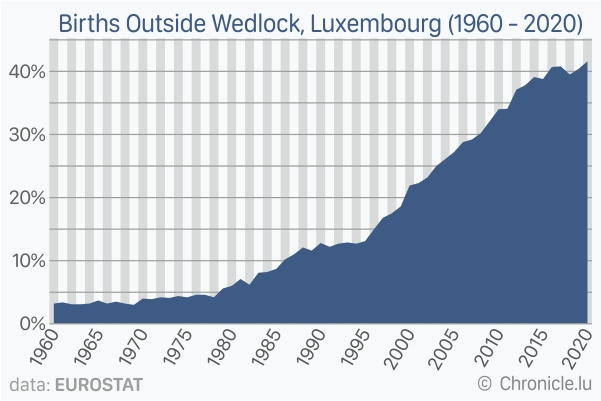
The share of live births outside marriage in Luxembourg has been increasing since the 1980s, and more dramatically since the mid-1990s, data from the European statistics agency Eurostat shows.
In 2020, 41.6% of live births in Luxembourg were outside marriage, compared to 3.2% in 1960, representing about a thirteen-fold increase in the last 60 years, and nearly doubling every decade since the 1980s.
Across the European Union (EU), for which data is available since 1993, the share of births outside marriage increased from 17.7% to 41.9% in 2020. Luxembourg recorded 12.9% births outside marriage in 1993.
The notable increase in extramarital births over the last four decades is indicative of new family patterns, especially non-marital relationships, cohabiting couples and, more recently, single parents.
In 2020, in at least eight EU Member States, the number of live births outside marriage outnumbered births inside marriage, namely: France (62.2%), Bulgaria (59.6%), Portugal (57.9%), Estonia (56.8%), Slovenia (56.5%), Sweden (55.2%), Denmark (54.2%) and the Netherlands (53.5%). Belgium, for which data is available up to 2018, reported that 59.6% of births were outside marriage.
Outside the EU, Iceland had one of the highest shares of births outside marriage, at 71.3%, in 2020.
The lowest share of live births outside marriage in the EU were registered in Greece (13.8%), followed by Croatia (22.8%) and Poland (26.4%).
In Hungary, a reverse in trend was dramatic: there were 30.4% births outside marriage in 2020, compared to 47.9% in 2015. Compared to 2019, five Member States reported a net decrease in 2020, namely, Spain (down 11.3%), Hungary (down 8.3%), Italy (down 1.6%), Slovenia (down 1.2%) and Germany (down 0.2%).
The average age of women at childbirth was 31.0 years in the EU in 2020. In Luxembourg, this was 32.3 years, the same as Italy and just below Ireland (32.6 years). In comparison, Bulgaria (27.8), Romania (28.2) and Slovakia (28.9) reported the lowest average age of women at childbirth in 2020.
In terms of share amongst siblings, 46.2% of children were first-borns in the EU, compared to 53.4% in Luxembourg, while fourth or higher order births accounted for 5.9% of all births in 2020. Finland had the highest share of fourth or higher order births at 10.0%, followed by Ireland (8.8%) and Estonia (8.7%). The lowest share of fourth or higher order births in the EU Member States was reported in Portugal and Luxembourg, both at 3.3%, followed by Denmark (3.5%).








